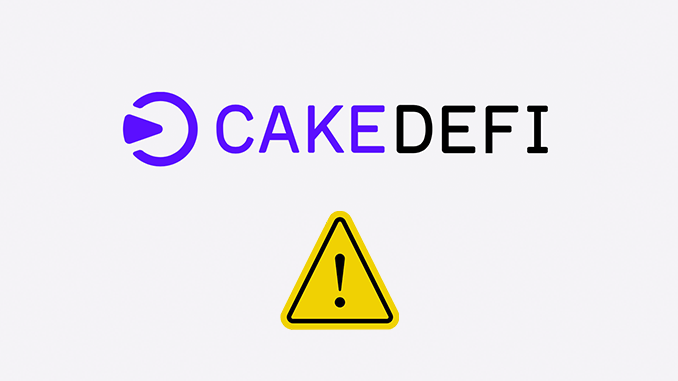
Once again, Julian Hosp is in the news: With his new project Cake DeFi, the equally busy and controversial crypto entrepreneur has provoked an investigation by the German Federal Financial Supervisory Authority (BaFin).
Julian Hosp is not only known like a colorful dog in the German crypto scene. His involvement in the Lyoness project smelled suspiciously of a Ponzi scheme, and his involvement with TenX ended with a bang and controversy. Critics accuse Hosp of recruiting customers again and again with false promises. Thus Cake DeFi as a new project of Julian Hosp was almost automatically under closer observation among experts. Confirmed this distrust now by a warning notice of the Federal Institution for supervision of financial service (BaFin). According to BaFin, Cake Pte. Ltd. as the company behind Cake DeFi is operating in Germany without a license and investigations have therefore been initiated. Consumers are warned by BaFin not to make investments on the Internet without thorough research, there is general talk of “fraud attempts”.
At Singapore-based Cake Pte. Ltd, Julian Hosp is listed as founder and CEO. Cake DeFi, in turn, does not list Germany on its list of countries where services cannot be offered. Also, the website of Cake DeFi is available in a German-language version and web data show that around 20 percent of the calls originate from Germany. Thus, it can be assumed that Cake DeFi is concentrating on wooing German customers.
Cake DeFi writes meanwhile by Twitter briefly and scarcely, one has knowledge of the communication of the BaFin. However, Cake DeFi is based in Singapore and therefore follows the legal framework there. Julian Hosp also reacted to the BaFin warning with a short video. He does not know what BaFin has to criticize. Customer funds at Cake DeFi are safe, he said, and the services will not be discontinued. Cake DeFi’s lawyers will take care of the matter, Hosp said. He recalled that BaFin has also warned against Binance, Bybit and other crypto companies without any far-reaching consequences.
Conclusion: deposits at Cake DeFi still safe?
Cake DeFi says it has more than 410,000 users and manages more than $700 million in assets. Using methods such as staking, lending and liquidity mining, Cake DeFi aims to generate above-average returns for customers’ deposits. Whether this plan works out in practice is controversial. BaFin’s warning against Cake DeFi is unlikely to have been a snapshot; the authority usually works thoroughly. Our relations with Julian Hosp are by no means harmonious. But to be fair, we would also like to mention that Hosp recently helped us with research to uncover what was happening with millions in assets at TenX.
But we would like to advise you as a German investor, like BaFin, not to invest in Cake DeFi. And if you have already invested there, it would probably make sense to withdraw deposits at Cake DeFi as a precaution. Experience shows that conflicts between the crypto industry and regulators usually end in favor of the supervisors – this is what Cake DeFi is now threatening to do in Germany with Julian Hosp.
Best place to buy Bitcoin:

Leave a Reply